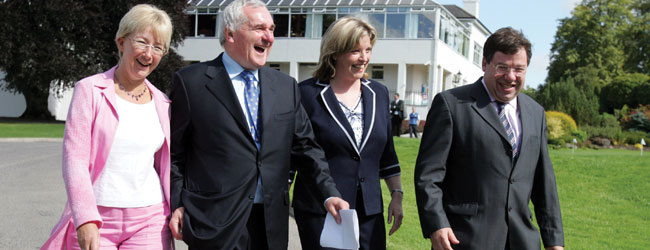6 December 2010
THE ECONOMIC AND POLITICAL CRISIS | WE DIDN’T ALL PARTY LIKE BRIAN LENIHAN
Sinn Féin warned about Government’s ‘boom and bust’ policies years ago

Former Fianna Fáil leader and Taoiseach Bertie Ahern with Mary Hanafin, Mary Coughlan and Brian Cowen taking a walk in the park
BRIAN LENIHAN, Fianna Fáil Finance Minister, has enraged countless thousands of people with his claim in an interview with RTÉ TV’s Prime Time programme: “Let’s be fair about this - we all partied.”
This is part of the Establishment narrative that we are all really to blame for the economic crisis because everyone was riding high on the Celtic Tiger and no one issued any warnings about the dangers of putting our economic heads in the jaws of the beast.
The Financial Regulator might not have warned us. Fine Gael didn’t. Did Labour? Fianna Fáil, Bertie Ahern, Brian Lenihan (pictured right) and – most of all – Brian Cowen certainly didn’t.
An Phoblacht and Sinn Féin did.
We aren’t crowing, “We told you so!” The financial crisis is nothing for anyone to be a smart Alec about.
We’re simply pointing out that, while Sinn Féin was being derided by so-called experts for being “economically illiterate”, we got it right.
And here’s one piece of evidence to prove it, from An Phoblacht back in 2006. It was written while Fianna Fáil was partying in the tent at the Galway Races, on golf courses and all over the place with the developers and the speculators, the property magnates, the bankers and all the other ‘experts’ who have gotten it so wildly wrong.
It makes sobering reading. It’s a pity that Brian Cowen and Brian Lenihan didn’t read An Phoblacht or listen to Sinn Féin. If they had, we might not have to listen to the mantra of the ‘experts’ today that ‘We are where we are.’
An Phoblacht, November 9th 2006
Lessons from the 1920s for the Tiger
An Phoblacht, November 9th 2006
g BY CAOILFHIONN
Ní DHONNABHÁIN
THERE are more than a few similarities between the Celtic Tiger and the United States of the ‘Roaring Twenties’. And I’m not talking about the Charleston, the Flapper or prohibition.
The US experienced an exceptional economic boom during the 1920s with many features that bear a striking similarity to the economic boom of Celtic Tiger Ireland.
Governments elected on manifestos of ‘prosperity and order’ pursued laissez faire economic policies, tax cuts and deregulation. A booming economy was accompanied by an explosion in consumerism...
Trade union membership had fallen drastically across the country. Lifestyles changed. Aspirations soared for those benefiting from the boom. People thought that the boom would last forever.
Optimism and abundant credit led to a huge wave of investment in the stock market resulting in artificially high stock prices. When the economy showed signs of slowing and share prices plummeted, it caused an extensive domino effect.
As the record levels of consumer spending were funded by credit, people deeply in debt when a price deflation occurred were in serious trouble. As investments lost their face value and the loans on them went bad, financial institutions collapsed, creating a monetary crisis. This caused massive withdrawals of bank deposits, leading some banks to collapse, confirming investors’ fears and resulting in more withdrawals.
The majority of economic commentators and media pundits speak as if the present Irish economic boom will never end. They seem to forget that capitalism is characterised by cycles of boom and recession. Abundant credit and government incentives have led to unprecedented investment in property - over-priced property.
The danger is - and the lesson from the economic boom of the 1920s which set the stage for the great depression that dominated the 1930’s - that a decline in the property market could result in a domino effect that would precipitate a recession.
We have record levels of household indebtedness, over-valued property, an economy over-dependent on construction and a government over-dependent on revenue from construction and consumerism.
We have optimism, heightened aspirations and rampant consumerism. But be warned - it can all change very quickly.
Our economic prosperity has not been used to the benefit of the people as a whole nor is it built on solid foundations. The difference between a slight downturn and a more significant recession rests on the ability of our economy to absorb economic pressures.
As it stands we are peculiarly exposed to the factors which could precipitate a dramatic economic slowdown - changes in the US property market, a global economic recessions, and rising interest rates.
What could be done to curb our exposure to such an eventuality?
Implement strategies to reduce dependence on foreign direct investment and to curb the reliance of the economy on construction. Introduce tax changes to reduce investor-led demand in the housing market. Implement polices which ensure a sustainable tax base so that the Exchequer is not at the mercy of fluctuations in consumer spending.
So the lesson is - it doesn’t have to end in a crash - but it could.
Follow us on Facebook
An Phoblacht on Twitter
Uncomfortable Conversations

An initiative for dialogue
for reconciliation
— — — — — — —
Contributions from key figures in the churches, academia and wider civic society as well as senior republican figures




